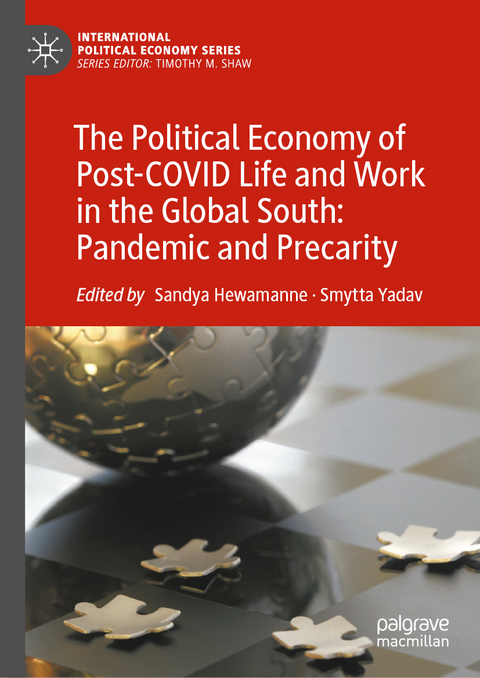
The Political Economy of Post-COVID Life and Work in the Global South: Pandemic and Precarity
Springer International Publishing (Verlag)
978-3-030-93227-5 (ISBN)
This edited volume highlights cascading effects of the pandemic and lockdown on informal economies of varied countries in the Global South. Uneven development after colonization, imperialism, and externally influenced conflict have caused many countries in the formally colonized or semi-occupied countries in the world to lag behind in wealth accumulation, investments in manufacturing, and technology. The fact that these countries were dragged into world market dynamics on an equal footing with already developed countries exacerbated these inequalities and saw the rapid burgeoning of informal economies. COVID-19 and the lockdown of western countries unravelled global production chains, resulting in hordes of workers in the Global South losing their livelihoods. Even people engaged in traditionally locally-bound economic activities, such as domestic work and sex work, found their livelihoods disappear. This volume brings together case studies from India, Brazil, Bangladesh, and Sri Lanka to analyze global economic disruptions as they affected informal sector workers who were already largely invisible within state development policies. The chapters question whether existing models of neoliberal development are still conducive within the post-pandemic Global South as it grapples with rebuilding economies, livelihoods, institutions, and systems of governance.
lt;p>Sandya Hewamanne is Professor of Anthropology at the Department of Sociology, University of Essex, UK. Her research interests include globalization, identity, cultural politics, and feminist and post-colonial theory. She has extensively published on global factory workers, free trade zones, and on intersections of gender, class, and sexuality.
Smytta Yadav is Economic and Social Science Research Council (ESRC) Fellow in the School of Education, Environment, and Development (SEED) at the University of Manchester, UK. She completed her Ph.D. in Anthropology from the University of Sussex. Her expertise is on informal economies, precarity, the state, and international development.
Chapter 1: Neoliberalism, Informality and Precarity.- Chapter 2: The Gendered Impacts of COVID-19 Pandemic: Narratives of Informal Women Workers in Indian Punjab.- Chapter 3: When hammer misses the nail: Health aspirations and internal migration in India.- Chapter 4: Female Labour Workforce And Precarity In India's Construction Sector.- Chapter 5: Diminishing Constructions: The Work of Exposure in Pandemic Times.- Chapter 6: Women workers at the forefront of COVID-19: A roadmap for recovery and resilience in India.- Chapter 7: Gendering Precarity in Postcolonial Sites: Health Securitization and Sexual Labor in India's Commercial Sex Trade Industry.- Chapter 8: Ready Made Garment (RMG) Factories Fightback During the pandemic: Evidence from Bangladesh.- Chapter 9: Demoralizing Impacts of the COVID-19 on the Bangladesh Ready Made Garment (RMG) Supply Chain.- Chapter 10: Wither Labor and Human Rights?: Precarious Work and Informal Economies in the Post-COVID-19 Global South.- Chapter 11: Supermarket workers: discovered and uncovered during Covid-19 pandemic.
| Erscheinungsdatum | 16.03.2022 |
|---|---|
| Reihe/Serie | International Political Economy Series |
| Zusatzinfo | XIV, 267 p. 3 illus., 2 illus. in color. |
| Verlagsort | Cham |
| Sprache | englisch |
| Maße | 148 x 210 mm |
| Gewicht | 498 g |
| Themenwelt | Sozialwissenschaften ► Politik / Verwaltung ► Europäische / Internationale Politik |
| Sozialwissenschaften ► Politik / Verwaltung ► Vergleichende Politikwissenschaften | |
| Wirtschaft ► Volkswirtschaftslehre ► Wirtschaftspolitik | |
| Schlagworte | global South • lockdown • Pandemic • Precarity • Uncertainty |
| ISBN-10 | 3-030-93227-3 / 3030932273 |
| ISBN-13 | 978-3-030-93227-5 / 9783030932275 |
| Zustand | Neuware |
| Informationen gemäß Produktsicherheitsverordnung (GPSR) | |
| Haben Sie eine Frage zum Produkt? |
aus dem Bereich


